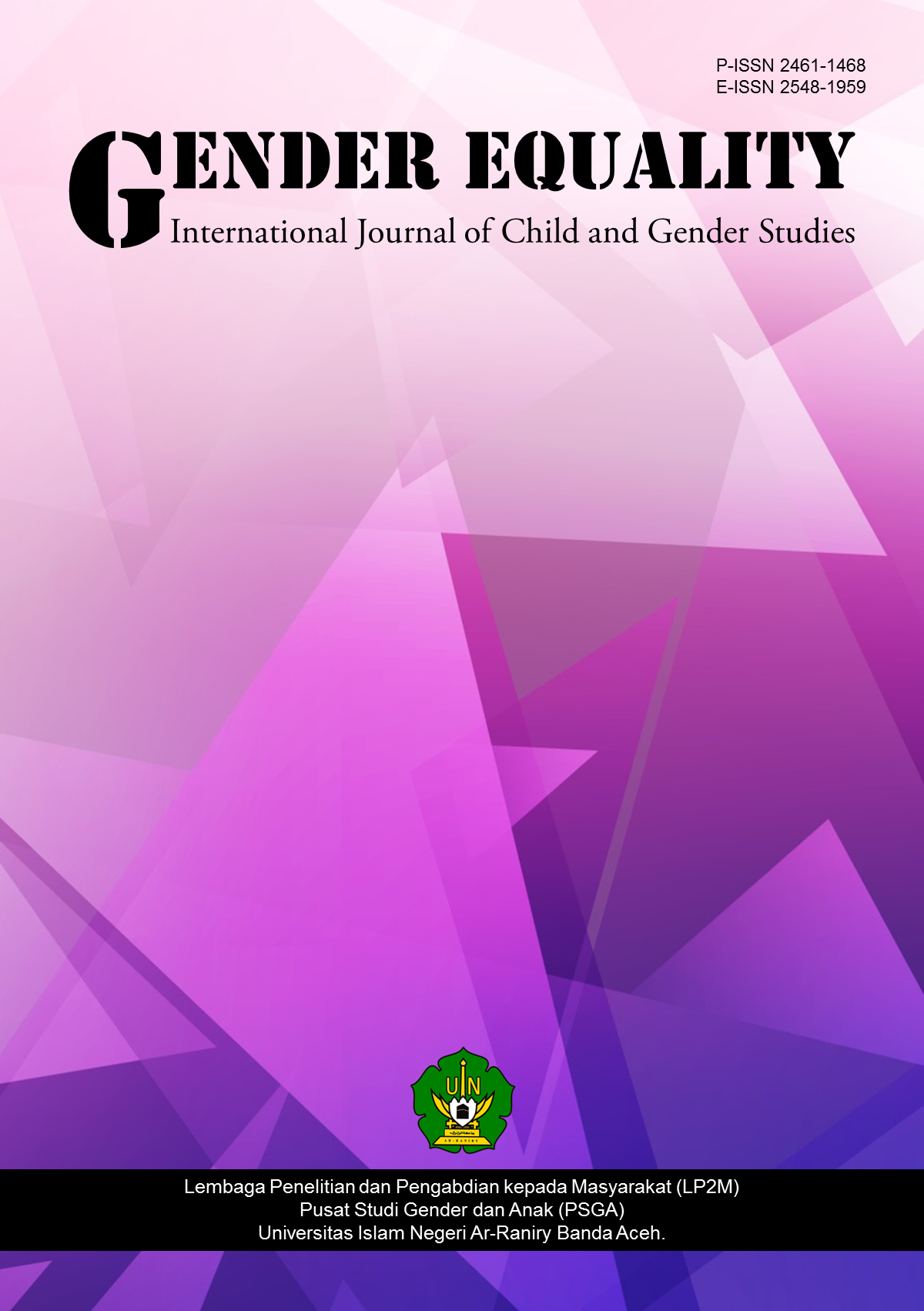Gender analysis in empowering women-headed family in Mojosongo Village, Surakarta
DOI:
https://doi.org/10.22373/equality.v7i2.10237Keywords:
Empowerment, gender, women-headed familyAbstract
This paper discusses the achievement for the level of equality in the women-headed family empowerment program in Kelurahan Mojosongo, Surakarta City. A woman is one of the population groups that are sustainable to poverty. Women experiencing poverty are women who become the head of the family. In Surakarta City, there are 11.502 women-headed families with a low welfare level. To resolve this problem, the Office of Women's Empowerment, Child Protection, and Community Empowerment (PPPAPM) of Surakarta made an innovation program by forming the Pekka (Women-Headed Family Empowerment) Forum in five poverty-stricken villages, one of which is Mojosongo. Kelurahan Mojosongo is a village that has the highest number of women-headed families, namely 727 people from five poverty-stricken villages. This study used gender analysis of the Longwe model to see the level of equality on women-headed family empowerment in Mojosongo, Surakarta City. The method used in this study was qualitative descriptive, and the data collection was obtained by observations, interviews, and documentation. The results of the study show that the level of equality in the women-headed family in Mojosongo only reached the second stage, namely access. Meanwhile, in the stages of awareness, participation and control have not been achieved. There are two implications of this study, namely practical and theoretical implications. For practical implications, the Surakarta City Government can use it as recommendations for empowerment programs, especially the women-headed family empowerment. The theoretical implications are expected to add to the research literature on gender analysis of the Longwe model in women's empowerment.
References
Aziz, G.A., Eny R., Warsilan. 2016. Faktor-Faktor yang Mempengaruhi Kemiskinan di Kabupaten Kutai Kartanegara. Jurnal Ekonomi Keuangan, dan Manajemen 12(1): 29-48
Badan Pusat Statistik. 2019. Profil Perempuan Indonesia 2019. Desember. Kementerian Pemberdayaan Perempuan dan Perlindungan Anak. Jakarta
Badan Pusat Statistik. 2020. Profil Kemiskinan di Indonesia September 2019. Januari. BPS RI. Jakarta
Dinas Penduduk dan Pencatatan Sipil Kota Surakarta. 2017. Jumlah Kepala Keluarga per Kecamatan Surakarta Semester 1 tahun 2017. Surakarta
Ernawati. 2013. Menyibak Perempuan Kepala Keluarga. Jurnal Muwazah 5(2):154-162
Fujiani, E. Dede, Y. Darusman, L. Oktiwanti. 2019. Pemberdayaan Perempuan Kepala Keluarga (PEKKA) Melalui Pelatihan Berwirausaha (Studi Pada Kelompok Zahra Prima di Kelurahan Sukamanah Kecamatan Cipedes Kota Tasikmalaya). Indonesian Journal Of Adult and Community Education 1(1): 20-25
Hardani, et al. 2020. Metode Penelitian Kualitatif dan Kuantitatif. Yogyakarta: Pustaka Ilmu
Genjot Penurunan Kemiskinan, Jateng Bidik Pemberdayaan Perempuan Kepala Keluarga. 2019. https://jatengprov.go.id/publik/genjot-penurunan-kemiskinan-jateng-bidik-pemberdayaan-perempuan-kepala-keluarga/
March, C., I. Smyth, dan M. Mukhopadhyay. 1999. A Guide to Gender Analysis Frameworks. Oxford: Oxfam GB
Putri, O.N, Rudi S.D & Gigin G.K.B. 2015. Pemberdayaan Perempuan Kepala Keluarga. Prosiding KS: Riset & PKM Unpad 2(2): 147-300
Susanti, Elly. 2013. Tingkat Keberdayaan Perempuan Kepala Keluarga (Kasus Pada Program PEKKA di Desa Dayah Tanoh Kecamatan Mutiara Timur Kabupaten Pidie Provinsi Aceh)
Downloads
Published
Issue
Section
License
GENDER EQUALITY: International Journal of Child and Gender Studies allows the author(s) to hold the copyright and to retain the publishing rights without restrictions. Authors who publish with this journal agree to the following terms:
- Authors retain copyright and grant the journal right of first publication with the work simultaneously licensed under a Creative Commons Attribution License that allows others to share the work with an acknowledgment of the work's authorship and initial publication in this journal.
- Authors are able to enter into separate, additional contractual arrangements for the non-exclusive distribution of the journal's published version of the work (e.g., post it to an institutional repository or publish it in a book), with an acknowledgment of its initial publication in this journal.
- Authors are permitted and encouraged to post their work online (e.g., in institutional repositories or on their website) prior to and during the submission process, as it can lead to productive exchanges, as well as earlier and greater citation of published work.



